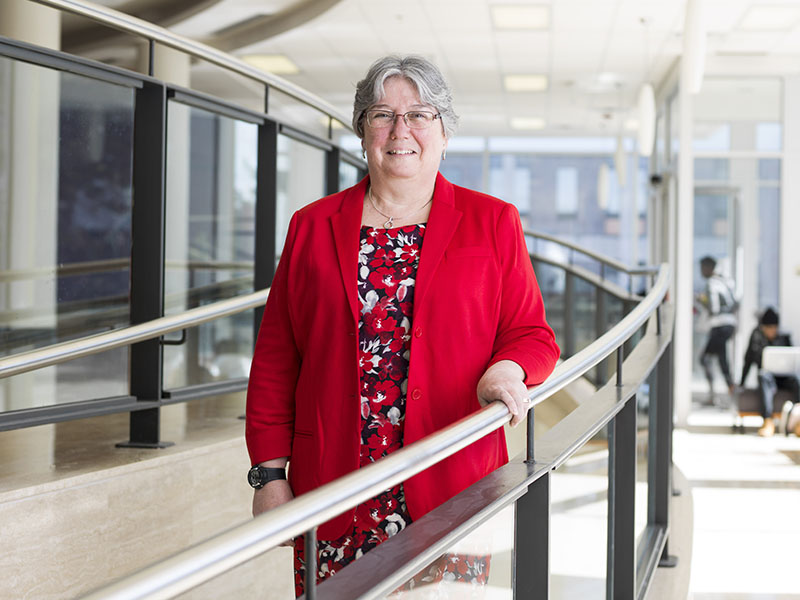Accounting for wellness
Merridee Bujaki (Professor, Accounting) is the Accounting Lead for The Healthy Professional Worker Partnership, a nation-wide initiative that investigates the relation between mental health, leaves of absence, and return to work from a comparative and intersectional gender lens. Data analysis for this project remains ongoing. Nevertheless, when we reached out to her for an update, Merridee was happy to share her thoughts about what the study has revealed thus far.

The Healthy Professional Worker Partnership focuses on knowledge workers in three domains: healthcare (dentists, midwives, nurses, and physicians), education (professors and teachers), and finance (accountants). These are people who tend to enjoy and value the work they do, which makes it hard for them to say “no” when new demands come up. Overwork and insufficient opportunity to de-stress are thus observed across the professions. As the team digs deeper into the data, however, they are noticing variations in the specific mental health issues that predominate in the different groups.
Among the seven groups of professionals surveyed, for example, accountants were less likely than other professionals to suffer from addiction or suicidal ideation. They were also significantly less likely to report mental health challenges despite evidence suggesting that stress, anxiety, and burnout are prevalent within the profession.
“People told us in their interviews that they are afraid of speaking up. They’re afraid they’ll be seen as weak or deficient in some way, and so they tend not to share as much.”
The nature of accounting culture and the structure of public accounting firms are two contextual factors that help explain this fear and unwillingness to report mental health challenges.
The accounting profession has been around, in roughly the same format, since the late 1800s. It developed around the construct of an “ideal worker” who could put the client’s needs before all else because he was unencumbered by such non-work responsibilities as child and elder care and by practical aspects of domestic life, like cooking and cleaning. Even though today’s accountants do not all conform to the historic profile (i.e., white, straight males with no responsibilities outside of work), the expectation that accountants should just push through their 12- and 14-hour days, week after week, remains because it’s thought it has always been that way in the profession.
For accountants working in public practice or professional service firms, the current matrix-like reporting structure also tends to discourage disclosures about mental health. Rather than reporting to one supervisor and working with a core team of colleagues, entry-level accountants in these firms regularly work on five or six teams, under as many different supervisors. For someone who is already struggling, the prospect of having to repeatedly disclose personal details about mental wellness can be overwhelming. What’s more, as the number of people involved in assessing or addressing the situation increases, so does the chance of encountering someone unsympathetic to the difficulties workers face.
Accountants also stand out as unique in another area the team is investigating: mental health leaves of absence and corresponding returns to work.
“While in some of the other professions, there was ample opportunity to look at leaves and returns to work, we weren’t able to do that in accounting because accountants were less likely than other professionals to take a leave of absence. What’s more, when they did take a leave of absence, they were less likely to actually return to work.”
Determining causality around these differences is difficult, but it’s possible that accountants, who are generally not unionized, may have less generous leave provisions or financial compensation during leave than workers in other professions in the study.
Some accountants who stayed in challenging positions decided to figure out for themselves how they could better navigate their workspace because they didn’t believe a leave of absence or change of employer would make any difference. Rather than changing their environment, they changed themselves by putting strict limits on their work hours or refusing to take work home with them, among other measures. However, this approach is only available to accountants who have enough seniority to be able to implement such changes. Moreover, because it is predicated on individual solutions, it risks reinforcing systemic problems within accounting culture.
Fortunately, the tides are starting to change, albeit slowly. Separate research that Merridee conducted with François Brouard, Leighann Neilson, and Sylvain Durocher (Telfer School of Management) indicates the emergence of two-way socialization within accounting firms, as younger generations of accountants push back against the expectations that filter down to them from senior levels. “It’s a bit tricky because certain compensation and reward systems continue to reward certain types of behaviour, but there are other models out there. It’s challenging, but there is potential.”
The Healthy Professional Worker Partnership acknowledges the support of the Canadian Institutes of Health Research (CIHR) and the Social Sciences and Humanities Research Council of Canada (SSHRC).
